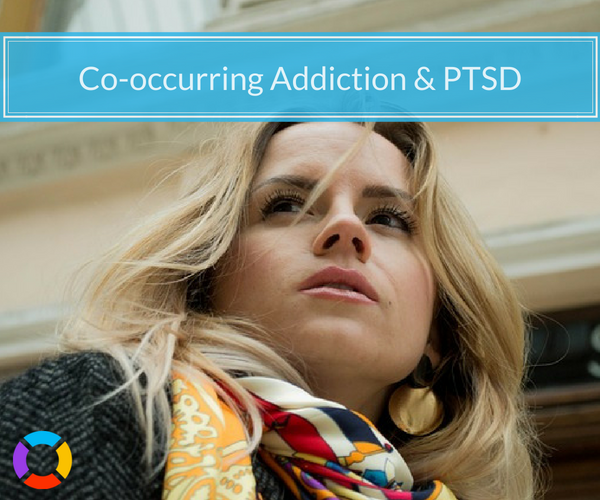PTSD and Addiction: How to Recognize the Signs and Find the Right Treatment

Post-traumatic stress disorder (PTSD) is a psychiatric condition. It manifests among survivors who’ve experienced a traumatic event. PTSD can also lead to addiction.
Its symptoms include intrusive thoughts and avoiding social situations. You might have negative beliefs and emotions and a continuous state of alert. These symptoms can result in severe disabling consequences like relationship issues, unemployment and substance use disorders (SUD).
There’s no need to struggle alone. Call now, get help today.
Why PTSD and Addiction Often Go Hand-in-Hand
PTSD and addiction are strongly associated. A substance use disorder is a medical condition characterized by an individual’s compulsive use of a substance like alcohol and drugs despite harmful consequences.
Trauma and substance use often coexist. Young adults who experienced trauma as children have 1.5x greater probability of binge drinking, and 4 out of 10 adults in the U.S. diagnosed with PTSD also have SUDs.
There are many reasons for the association between PTSD and substance abuse. Risk factors that may predispose you to experiencing traumatic events include poverty, bad childhood experiences and mental health issues.
These are also associated with substance misuse. Surviving traumatic events also fuels desires to avoid negative states. Many individuals try to escape their pain or deal with PTSD symptoms with drugs and alcohol.
That’s why integrated care for both conditions is critical to help a person heal.
Prevalence of PTSD
Sexual assault is the most common type of traumatic event in American women with PTSD, affecting 12.3% of them. It’s almost double the prevalence of PTSD in the general population that ranges from 6.1% to 9.2%. Other causes include sexual violence, family-related events like losing a child and physical violence.
Military veterans are also vulnerable to trauma’s consequences. Over 15% of Vietnam vets had PTSD two decades after it ended. Over 50% of veterans with alcohol use disorders also have PTSD.
What Is Post-Traumatic Stress Disorder (PTSD)?
Trauma is an emotional response to a terrible event.
Combat, accidents, childhood trauma, torture, sexual assaults, and domestic violence are all traumatic events that affect how a person feels, thinks, behaves and functions even years after they occurred. The person experiencing them feels physically or mentally harmed and threatened.
PTSD was recognized as a medical condition in the United States in 1980 when the American Psychiatric Association included it in the Diagnostic and Statistical Manual of Mental Disorders (DSM).
PTSD Development and Consequences
One theory on the origins of PTSD indicates that the mechanisms that regulate fear in the brain are altered in people with PTSD and makes them more susceptible to the emotional effects of traumatic memories. Genetic inheritance may also predispose to PTSD.
Drug abuse also exposes individuals to traumatic events. People who abuse substances may frequent circles where violence can occur. PTSD may also lead to SUDs because individuals often use substances to numb themselves from painful memories.
People with PTSD have elevated suicide risks. They may experience a decline in their capacity to remember things and sustain attention. PTSD is also associated with a heightened risk of heart problems, insomnia and obesity. They tend to feel isolated and avoid socialization.
These behaviors end up weakening connections to spouses and children due to missing important events. They may also become aggressive and struggle at their jobs.
Complex Post-Traumatic Stress Disorder
The World Health Organization (WHO) recognizes complex post-traumatic stress disorder (CPTSD) as a separate category of PTSD.
Some types of persistent long-term trauma, like abuse that lasts years, versus a one-time traumatic incident like a car accident. CPTSD may cause additional symptoms, particularly regarding personal identity and the capacity to control emotions.
In the United States, the DSM-5 does not recognize CPTSD as a different type of PTSD, but it includes a subtype called dissociative PTSD that encompasses symptoms of derealization, like feeling the world is unreal. This is another type of complex response to trauma.
Signs and Symptoms of PTSD
Signs and symptoms of post traumatic stress disorder may manifest soon after a traumatic event or can take several weeks or even months to affect a person’s life. Diagnosing PTSD requires a comprehensive approach from a trained professional.
There are 4 categories of symptoms according to the DSM-5 that a person must meet for a PTSD diagnosis.
Re-Experiencing or Intrusion Symptoms
- Nightmares about the traumatic event
- Unwanted distressing memories
- Spontaneous flashbacks
- Distress due to intrusive thoughts
These symptoms may be triggered by anniversaries, social situations, or environmental cues like smells, loud noises or movies.
Avoidance Symptoms
- Trying to avoid feelings or memories about the traumatic event
- Avoiding external reminders of trauma like places, objects, social situations, people or activities
Avoidant behaviors can disrupt a person’s life and take many forms. Some individuals stop driving or attending places. Others stop therapy abruptly or rely on substances to numb or avoid their emotions.
Negative Cognitions and Mood Symptoms
- Distorted negative beliefs about themselves, other people and the world
- Blaming themselves or others for the traumatic events based on distorted ideas
- Negative emotions like anger, fear, shame and guilt
- Reduced interest and participation in everyday life
- Feeling disconnected from others
- Difficulties experiencing positive emotions
Arousal and Reactivity Symptoms
- Angry outbursts or irritable behavior
- Self-destructive behaviors (like excessive drinking)
- Being easily startled
- Difficulties concentrating
- Hypervigilance
- Sleep problems
Some individuals with PTSD also manifest dissociative symptoms such as depersonalization by observing themselves from a distance, derealization or amnesia in which they forget details about the traumatic event.
The National Center for PTSD offers self-assessment and screening tools. But they’re only informative, as a PTSD diagnosis can only be established by a qualified professional.
How PTSD Leads to Addiction
PTSD and substance use coexist for multiple reasons. The self-medication hypothesis proposes that individuals with PTSD use substances to self-medicate symptoms like bad memories or negative emotions.
The brain’s interconnected nature may also explain trauma and addiction co-occurrence. Trauma affects brain regions that regulate emotions and rewards via a dopamine response. Individuals with PTSD may be more prone to seek substances to cope with negative emotions or feel pleasure.
Unprocessed trauma may drive people toward substances for relief, as a patient in treatment explains: “Years of avoiding my trauma ended after recovery.”
Call today, and begin healing past your trauma.
Dual Diagnosis: PTSD and Co-Occurring Substance Use Disorders (SUD)
PTSD and SUD association is strong. About 25-49% of individuals with PTSD also battle drug or alcohol addiction. This coexistence is called a dual diagnosis and means a person faces two simultaneous psychiatric disorders.
Accessing dual diagnosis PTSD treatment is important because people with SUD and PTSD often have more severe symptoms alongside poorer outcomes and an elevated risk of relapse if their recovery isn’t coordinated as part of an integrated protocol targeting both conditions simultaneously.
Failing to tackle trauma when someone battles a SUD or ignoring a person’s drinking habits when treating PTSD may undermine the efforts to successfully treat each condition. This can reinforce the negative consequences of each disorder and worsen symptoms.
You can access our directory of facilities at Detox.com. These offer the best dual diagnosis programs in the United States.
Veterans and PTSD-Related Addiction
PTSD in veterans may result as a consequence of active duty. Combat can take a toll on a person’s mental health. Reintegrating into civilian life is also challenging and is often characterized by feelings of inadequacy and financial difficulties.
Many veterans push aside PTSD symptoms or are reluctant to report them due to worries of stigma or career repercussions. Many veterans use substances to deal with PTSD symptoms like flashbacks and disrupted sleep. In the U.S., 2.8 million veterans (14%) struggle with a SUD, and 2 in 10 veterans with PTSD also have SUDs.
You endured countless trials bravely serving your country. Help aligned with military values for veterans with PTSD and addiction is available.
Treatment Options for PTSD and Addiction
Treatment for PTSD starts with an assessment by a qualified professional to evaluate substance use patterns and PTSD symptoms. Treatment can last between six months to a year, but its duration depends on each person’s case.
Based on medical criteria, a person may start a detox program in a controlled environment to stop and safely manage the withdrawal symptoms and cravings that may emerge. Medication can be used if stabilization is needed.
After detox comes counseling. Therapy helps uncover the beliefs and thoughts that may fuel PTSD and substance abuse. They’ll equip you with coping skills.
When treatment in a facility ends, aftercare begins. This is an integrated plan that includes group activities and continuous counseling to deal with the challenges of everyday life that can trigger trauma symptoms or relapse.
Overcoming post traumatic stress disorder and substance abuse is possible. They demand work and commitment, but the result is a new life you are proud of and makes it all worthwhile.
PTSD Rehab Programs and Levels of Care
PTSD rehab can be accessed in an inpatient program in which a person stays for about 30-45 days in a facility. Recovery is a full-time occupation and may include access to medication for any needed detox, individual and group counseling, and trauma-focused therapies.
Outpatient programs offer the possibility of attending sessions part-time. This allows you to hold a job and stay with their families while recovering.
Partial hospitalization programs (PHP) offer a middle ground between inpatient and outpatient alternatives. These programs are recommended for more severe cases and may require full commitment as recovery activities are scheduled during the day. But you’ll spend nights at home.
Intensive outpatient programs (IOP) are better suited for individuals with milder symptoms who have jobs or family responsibilities. They can be arranged around a person’s schedule to access counseling and peer support for lasting recovery.
PTSD rehabilitation is more effective when delivered in trauma-informed centers with trained staff and peers. You can find a facility close to you.
Best Therapies for PTSD and Addiction Recovery
Prolonged Exposure Theory (PE)
This theory employs repeated exposure to trauma-related triggers in a safe environment. It helps process traumatic memories. Facing fear may reduce its power and reduce avoidance behaviors.
Concurrent Treatment Using Prolonged Exposure (COPE)
This program integrates PE with cognitive-behavioral skills into one. They simultaneously address traumatic memories and substance use patterns, helping individuals process trauma and reduce relapse.
Accordingly, PTSD therapy works best when trauma and SUD are treated together. It’s the best therapy for post traumatic stress disorder.
Cognitive Processing Therapy (CPT)
CPT identifies and replaces harmful beliefs. It reframes unhelpful thoughts and may shift dynamics fueling SUD and trauma symptoms. Changing beliefs give you a stronger path to recovery.
Eye Movement Desensitization and Reprocessing (EMDR)
EMDR uses guided eye movements during recall of traumatic memories. It can assist the brain in reinterpreting traumatic events. Doing so reframes what trauma means may reduce PTSD symptoms.
Group Therapy & Peer Support
Attending interventions with peers can simultaneously battle PTSD and SUDs. The process builds community, reduces isolation and reinforces healing skills. This connection may increase accountability and internalization of recovery skills.
Medications for PTSD and Co-Occurring Conditions
If a person has co-occurring conditions such as depression and anxiety, a physician may prescribe selective serotonin reuptake inhibitors (SSRIs) or serotonin-norepinephrine reuptake inhibitors (SNRIs) that can address these underlying conditions to improve the chances of recovery.
Two of these medications – sertraline (Zoloft) and paroxetine (Paxil) – are specifically approved by the Food and Drug Administration for treatment of PTSD.
If you require medication-assisted treatment (MAT) for addiction, the staff may prescribe Suboxone or Vivitrol to assist with craving reduction and control of withdrawal symptoms.
Current guidelines state that non-pharmacological options like trauma-informed therapy are preferred for managing PTSD in people with a dual diagnosis of SUD, but medication can still be valuable when physicians consider it necessary.
Find PTSD and Addiction Help Near You
PTSD and SUDs are treatable conditions. We offer access to the best local PTSD and addiction recovery centers in America so you can leave trauma behind and start a new life.
The process of accessing help doesn’t need to be complex:
- Check with your insurance or Medicaid provider which facilities are covered.
- Find a center that aligns with your values, needs, and budget.
- Evaluate the best choice for your recovery journey.
The best part is that you don’t need to walk alone. If you are struggling with PTSD and drug or alcohol abuse, we are here for you.
Just call today, and begin healing as soon as possible.
How to Help Someone with PTSD and Addiction
If you’re wondering how to help someone with PTSD and addiction, here are some recommendations:
- Listen closely and provide nonjudgmental support. Let your loved one choose when they want to talk about their trauma.
- A genuine disposition to patiently listen may be more helpful than offering solutions.
- Show acceptance, encourage healthy habits, and invite them to participate in relaxing activities that foster connection.
- Don’t pressure, criticize, or share cliché advice like “time heals all wounds.” PTSD and SUD are medical conditions so don’t minimize their impact on a person’s life.
- Gently encourage seeking PTSD and addiction support from qualified facilities. PTSD and SUD treatment works and can help your loved one start over.
Milestones otherwise unimaginable are possible. One trauma survivor shares: “After treatment, it was the first time I hugged my partner without shame.”
Trauma-informed care breaks through isolation and surround individuals with peers who understand. One patient explains, “I stopped feeling that I was the only one in the world suffering with PTSD and alcohol addiction.”
Another PTSD warrior concludes, “This recovery facility gave me hope when I had none.”
FAQs: Quick Answers to Common PTSD and Addiction Questions
Yes, there are effective non-pharmacological ways to treat PTSD, including COPE, Prolonged Exposure, Cognitive Processing Therapy, EMDR, group therapy and peer support.
You can recover from PTSD in qualified rehab facilities across the U.S. The best one depends on where you live, insurance, budget, and personal circumstances.
Yes. Trauma may contribute to SUD as it affects the regions of the brain responsible for self-control, while its symptoms can lead to employing drugs to numb their effects.
Yes. Drug abuse can expose you to dangerous situations that may result in incidents leading to traumatic consequences.
Get Help Now: Call, Chat, or Find a Rehab Program
Finding local PTSD and addiction recovery centers is essential to starting your recovery journey. Individuals must deal with trauma and substance abuse issues get the help they need to live the life they want.
If you’re considering accessing treatment for PTSD and SUD, we recommend you collect your insurance information and medical history.
Call now and explore treatment needs, including the severity of your condition, your budget, and personal preferences.
Click to find the best local PTSD and addiction detox center to begin your healing journey. Help is always available 24/7 to help you get better.



